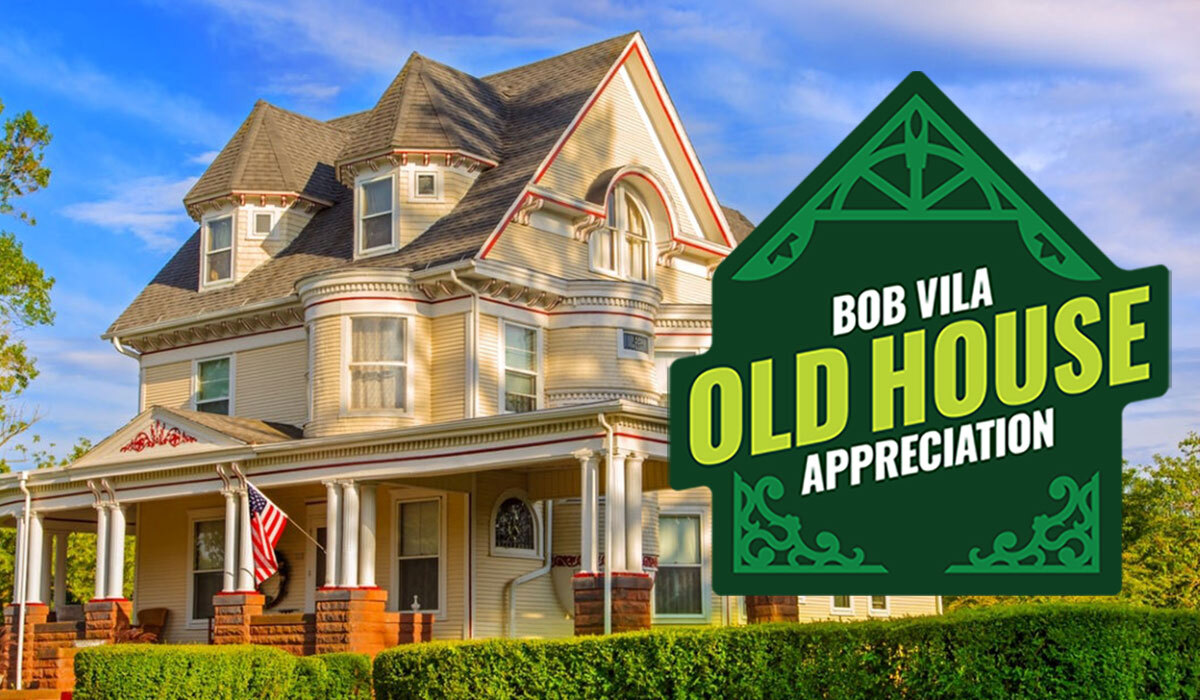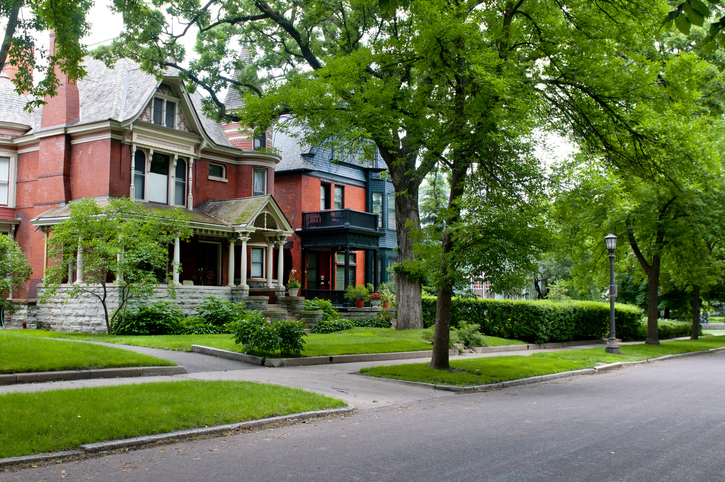

We may earn revenue from the products available on this page and participate in affiliate programs. Learn More ›
Welcome to Old House Appreciation with Bob Vila, a month-long series dedicated to showing you the best places to find historic homes, pros and cons of investing in an older house, potential repairs and precautions, and our favorite examples in a variety of house styles to keep you inspired along the way. We’ve included current market trends mixed with Bob’s tried-and-true advice, our vetted shopping guides, and the behind-the-scenes tips you need to make your old house a home.
As the housing market begins to cool off and prices recede, opportunities are opening up for buyers looking for a deal. There are few better deals to be had than on homes that fall in the older category. While old homes present challenges with their aging foundations and vintage utilities, they also offer the chance to be a steward to a unique property and create a home like no other.
If you’re not scared off by the flaws of an older home, you’ll find charm, architectural styles unlike the cookie-cutter designs of new construction, and quality building materials. While these characteristics make old homes an attractive option, anyone considering one should go into the search and buying process prepared. Educating yourself on the challenges you might face when buying an older home will help you decide if those challenges are worth it to find your dream home.
What exactly qualifies as an old home?

We tend to refer to old homes as any home that isn’t new, but the truth is it’s more complex than that. Most experts agree there are three classifications for old homes and the items in them: vintage, antique, and historic.
Vintage homes are at least 20 years old but not older than 100 years. Antique houses are those at least 100 years old or older. For an antique house to be officially historic, it has to meet the requirements of the National Register of Historic Places, which include being related to a significant person or event in history and embodying construction techniques or characteristics that make it historically valuable. In many areas, vintage homes can be declared historic if they’re at least 50 years old.
Age isn’t the only quality that defines an older home. Houses are also often defined by architecture and building styles that place them in specific architectural periods, including popular styles like Colonial, Tudor, and Victorian.
MORE ON OLD HOUSE STYLES:
> 20 House Styles and Types All Homeowners (and Home Buyers) Should Know About
> Match Your Home Style With Your Decorating Style
Buying old over new can save you money up front.
While such factors as location, square footage, condition, and housing market fluctuations all play a major role in how much any home costs, you’re generally going to pay less for an older home than a modern home. While that’s pretty much been the case for a long time, the rising cost of materials and labor in recent years have made the cost gap between new construction and old homes even greater. In fact, new construction can cost upward of 30 percent more than an older home of comparable size in a similar location.
You’ll likely need to put more money into an older home after moving in than you would a new build, but a big chunk of that money will go into the long-term value of your home. The average ROI on home improvement projects is around 70 percent and can be even higher if you’re able to complete some of the labor yourself.
Returning an older home to its former glory and maintaining it may be an investment of time and money, but you’re more likely to save on the front end by choosing old over new. You can apply that savings to the improvements and repairs an old home may require, while adding your personal touches along the way.
Now is a good time to buy an old home.

Home prices have been skyrocketing to the tune of a nearly 30 percent increase nationwide since the start of 2020, which might make you think twice about buying a home right now. That said, most financial analysts say a decline is imminent. With the Federal Reserve raising rates to combat inflation, so too are mortgage rates climbing, discouraging buyers from buying. With fewer buyers, the inventory of available homes will rise. This sets the stage for a decline in home prices, creating new opportunities, especially for those who aren’t afraid to take on an older home that may need some TLC.
MORE ON THE FINANCIAL SIDE OF BUYING AN OLD HOME
> Are Old Homes Cheaper Than New Ones?
> 12 Ways Buying a Home Has Changed Over the Past 50 Years
Find your perfect old home with specific searches.
While developers’ marketing efforts make finding new construction relatively easy, finding that diamond-in-the-rough old home can be more of a challenge. Fortunately, you have a few options to aid you in your old home search. You can take the traditional route and contact a local real estate agent if you’re looking in a specific area, or you can take your old house hunt online.
The website OldHouses.com, which has been helping old house buyers and sellers connect since 2004, provides listings of very old homes and homes that aren’t so old. The site allows you to search for homes by state in increments of 50 years ranging from the early 18th century up to the present. Circa is another outstanding online source for old homes. The site, which allows you to search by state, country, price, and a long list of architectural styles, includes listings dating from the 18th century up through the mid 20th century.
MORE ON FINDING THE RIGHT OLD HOME FOR YOU:
> Guide to Buying Old Homes by Decade
> 9 Resources for Finding Amazing Old Houses for Sale
> Best Places in the U.S. to Find Historic Homes for Sale
Buyer beware when selecting an old home.

Buying an old home isn’t something you should jump into without doing your due diligence first, so plan to take the time necessary to evaluate your options. An old home can bring you a lot of joy and become a rewarding project as you restore and maintain the home’s history. However, old homes can have serious issues.
Some old homes contain outdated building materials, such as asbestos and lead paint, which can be hazardous to your health. Structural issues with the foundation are also common issues with older homes. The electrical system may be outdated and out of code or include ungrounded outlets. There also might be issues with the roof that aren’t visible from the ground or plumbing issues that aren’t apparent until you move into the home. A common replacement project for old homes is the HVAC system, along with updating energy efficiency. In some cases, you might even need to update the floor plan, allowing for modern lifestyle and daily needs.
Unless you take ownership of an old home that someone else invested tens of thousands of dollars in to restore or update, you could be taking on major renovations with your new-to-you old home. The older the home, the more severe these issues are likely to be. Given the severity of these problems, it’s little wonder that the cost of remodeling an old house can be exorbitant. When remodeling an antique home entirely, expect to pay between $100 to $400 per square foot.
That said, if you thoroughly inspect the home with the help of professionals, you should be able to find an old home with good bones and lots of potential. The upside to many older homes is that the materials and methods used to build them have stood the test of time—literally keeping the home standing after decades or even centuries. So while you need to prepare yourself for major repairs, you might find that some of the home’s requirements are spot repairs rather than full teardowns, depending on the age and condition of the house.
While you may be handy and quite capable of taking on several renovations yourself, some problems require the expertise of a professional. By identifying all of the major issues prior to purchasing an old home, you have a chance of getting the seller to fix some of these problems or lower the price of the home to account for the cost of hiring a professional.
MORE ON EVALUATING THE CONDITION OF AN OLD HOME:
> 12 Specialists You Need If You’re Buying an Old House
> The 14 Most Common Building Code Violations in Old Homes
Open a savings account for your old home.
Taking on major repairs is a big deal. Old home buyers often prioritize the required repairs by looking at what will have the biggest impact on day-to-day living and the home’s long-term value. Of course, a home that’s older is going to need more attention than a home built in the last decade, so ongoing repairs are a reality of old home ownership.
You need to be prepared for both unexpected costs and any postponed major repairs by setting aside money or investing in a home protection plan. Purchasing a home warranty from a reputable company is a good way to avoid paying a big chunk of money for routine appliance and system repairs.
In addition to a good home warranty, a good rule of thumb is to set aside 1 percent of the purchase price of the house each year. For very old homes that may require more maintenance, consider saving 2 percent annually to give yourself peace of mind.
Not all surprises are bad ones.
While old homes can have many problems lurking under their charming curbside appeal, there are also treasures to be discovered as well. In some cases these treasures are literal. Stories abound online of owners uncovering cash, jewelry, or even yellowed love letters hidden in the walls of old homes.
While those discoveries may be rare, there are other nice surprises that are more common, such as beautiful hardwood floors hiding under old shag carpeting. Old homes can reveal transom windows that still open, dumbwaiters that rise between floors, and even fireplaces behind plaster walls. You never know what surprises your own old home will hold.
MORE ON THE BEST FEATURES OF OLD HOMES:
> The Most Magical Features of Old Houses
> 15 Old House Features We Were Wrong to Abandon
Choose to restore, remodel, or redecorate.

Once that old home is under your care, there’s more than one way to proceed with renovations. You can return the home to its former glory, bring it into the 21st century, or forge your own path and turn the home into something uniquely you. Choosing what to remodel and what to keep is a personal choice for each homeowner based on their tastes and budget for repairs.
Restore – If you’re the kind of person who sees yourself as the latest in a long line of stewards for an old home, you may be inclined to restore it. Rather than updating an old home to look modern, you can revitalize it by renovating the interior and exterior to fit the time period in which it was built. Using period pieces through salvage, authentic materials, and even matched paint colors from the time period, you can recreate the home’s original beauty.
Remodel – Bring a decades old home into the present by updating it to suit modern designs and needs. This type of renovation could involve removing interior walls to create an open floor plan, turning small closets into walk-ins, or adding cabinets in the kitchen for additional storage but keeping vintage kitchen features like the appliance garage. Modernizing an old home doesn’t have to mean removing all the vintage or antique charm. You just might find new ways of using old spaces, such as a combo laundry room and pantry, an outbuilding, or an attic.
Redecorate – Chances are you were attracted to the home because it meshes with your own sense of style. Take it up a notch by infusing it with your personal touch. Your choice of hardware and fixtures will showcase your personal taste, as will updated finishes on countertops, floors, and walls. Painting your old home in bright colors or hanging your favorite wallpaper can give new life and energy to the old space. Sometimes the contrast of eclectic decor against the backdrop of a traditional home can be uniquely stylish, as can traditional or earthy touches in a modern home design.
MORE ON REMODELING AND RESTORING OLD HOMES:
> Solved! How Can I Find the History of My House?
> When Remodeling an Old House, Which Features Should You Keep?
> 12 Ways to Make an Old Home Energy Efficient
Get inspired by your favorite old home styles.
As you dream of the perfect old house for you, visualize what you can do with it by looking at what others have done with their venerable homes. Get inspired by before and afters that show historic homes returned to the height of their appeal, or follow social media accounts that showcase old home stewardship and foster community among homeowners.
It should come as little surprise that here at BobVila.com we love old homes. After all, our publication’s namesake has been one of the best known names in home restoration for more than four decades. Over the years, we’ve gathered our favorite homes so you can see inspiring examples in various styles, including our favorite Victorian homes, Tudor style houses, and 13 homes from the original colonies that are still standing today.
Before you take the plunge into old home buying, try staying overnight in a similar style of home that’s listed as a rental on Airbnb or as an historic bed and breakfast. Several cities in the U.S. are known for their old home neighborhoods and could make a perfect day trip to discover what’s available near you.
Of course, while you’re saving for your old home purchase, you can always bring some of that vintage or antique charm into your current house to keep your dream alive. A few ways to make your new house look old include installing crown molding, swapping new hardware for vintage finds, and decorating with furnishings from a beloved era.
Living in an old home isn’t for the faint of heart, and you’ll want to go into any purchase with your eyes open to potential pitfalls. However, with the right preparation and a little patience, old home ownership can be an opportunity to learn new skills, stay inspired, and preserve a piece of our shared history.
